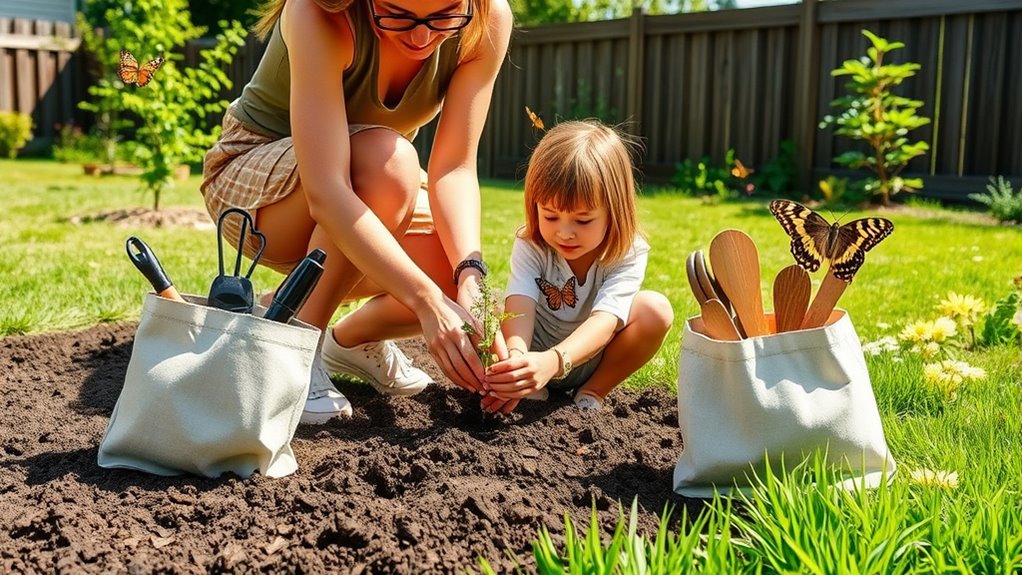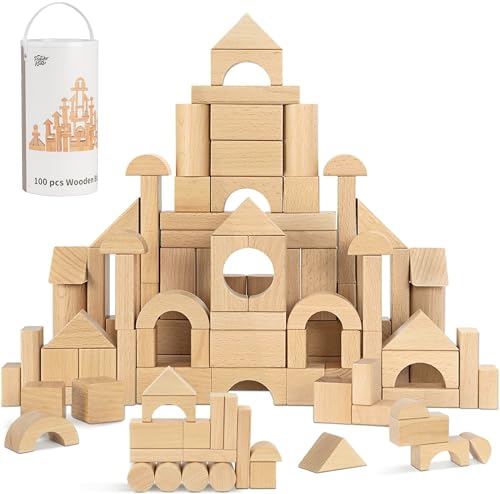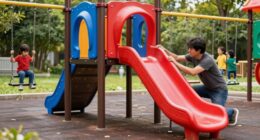To teach your kids eco-friendly habits, involve them in choosing sustainable toys made from natural materials like wood or organic cotton, and show them the importance of durability. Start composting food scraps and yard waste to demonstrate recycling nutrients and reducing waste. Encourage daily practices like using eco-friendly cleaning products and reducing plastic use. Consistently engaging your children in these activities helps build lifelong environmental responsibility—keep exploring to find more simple ways to foster sustainable habits.
Key Takeaways
- Teach children to choose and care for eco-friendly toys made from natural, non-toxic materials to promote sustainability.
- Involve kids in composting food scraps and yard waste to foster environmental responsibility and waste reduction.
- Model eco-conscious behaviors like using eco-friendly cleaning products and reducing energy consumption at home.
- Encourage mindful consumption by discussing the environmental impact of products and choosing durable, sustainable options.
- Incorporate daily routines such as waste sorting and eco-friendly habits to build lifelong environmental awareness.

Ever wondered how you can raise your child in a way that benefits both them and the planet? One impactful way is by making eco-friendly choices in your daily life, starting with sustainable toy choices. When selecting toys, look for items made from natural, non-toxic materials like wood or organic cotton, and avoid plastics that can harm the environment. Not only do these toys last longer, but they also teach your kids to value quality and sustainability. Involving your children in choosing and caring for eco-friendly toys helps them develop an early appreciation for environmental responsibility.
Choosing natural, non-toxic toys teaches kids about sustainability and environmental care.
Another essential habit is composting at home. Composting transforms food scraps and yard waste into nutrient-rich soil, reducing landfill waste and lowering greenhouse gases. You can start small by setting up a simple compost bin in your backyard or even using a worm bin indoors if space is limited. Teach your kids to separate compostable materials like fruit peels, vegetable scraps, coffee grounds, and shredded paper. Explain how composting helps reduce waste and supports plant growth, making it a practical and educational activity. As they watch organic waste turn into soil, they’ll understand the importance of recycling nutrients and minimizing waste.
Integrating sustainable habits into your daily routine can foster a lifelong respect for the environment. In addition to composting, you might consider using eco-friendly cleaning products and reducing energy consumption at home. These small but consistent actions reinforce the values of conservation and responsible resource use. When you choose sustainable toys, you’re showing them that mindful consumption can make a difference. It encourages them to think critically about their choices and the impact they have on the world. Similarly, involving your kids in composting at home demonstrates the importance of waste reduction and resourcefulness. It’s a hands-on way to teach environmental stewardship and responsibility early on.
Balancing eco-conscious habits with everyday life might seem challenging at first, but consistency makes it easier. You can start by replacing plastic toys with eco-friendly alternatives and gradually incorporate composting into your routine. Keep it fun and engaging—let your children help sort waste or choose their own sustainable toys. These small steps, when done regularly, create a ripple effect that fosters a lifelong commitment to caring for the planet. Ultimately, teaching your kids about sustainable toy choices and composting at home equips them with the knowledge and habits to become environmentally conscious adults. Plus, it’s a wonderful way to bond as a family while making a positive impact on the world around you.

Pidoko Kids 100pcs Natural Beech Wood Building Blocks for Toddlers 1-3, Wooden Blocks with Storage Bucket and Shape Sorter Lid Montessori Toys for 1 2 3 Year Old Boys and Girls, Preschool Learning
Solid Beech Wood Blocks: 100 Pieces. Made from durable natural beech wood, this toddler block set includes 100…
As an affiliate, we earn on qualifying purchases.
As an affiliate, we earn on qualifying purchases.
Frequently Asked Questions
How Can I Involve My Kids in Sustainable Shopping Decisions?
You can involve your kids in sustainable shopping by making it a fun activity. Teach them about recycling habits and eco-conscious choices while shopping. Let them pick out eco-friendly products and explain why you choose items with minimal packaging or reusable options. Encourage questions and discussion, so they understand the importance of making environmentally friendly decisions. This hands-on experience helps them develop habits that support sustainability.
What Are Simple Ways to Reduce Plastic Waste at Home?
To reduce plastic waste at home, start with simple recycling tips like sorting your recyclables properly and avoiding single-use plastics. Use reusable containers for lunches, snacks, and leftovers instead of plastic bags and bottles. Encourage your family to buy in bulk to cut down on packaging. These small changes make a big difference, helping you create a more eco-friendly household that minimizes plastic waste and promotes sustainability.
How Can I Teach Children About Composting Effectively?
You can teach kids about composting by debunking common composting myths and demonstrating simple composting techniques. Show them that composting isn’t complicated and involves just food scraps and yard waste. Use hands-on activities like creating a compost bin together, explaining what can and can’t go in. Keep it fun and interactive, so they understand the benefits of composting and feel motivated to help reduce waste in eco-friendly ways.
Are Eco-Friendly Products Safe for Children’S Skin?
You might wonder if eco-friendly products are safe for your child’s skin. Generally, they emphasize chemical safety and ingredient transparency, making them a better choice than conventional options. Look for products that clearly list natural ingredients and avoid harmful chemicals. Always do a patch test first, and choose brands committed to transparency. This helps guarantee your child’s skin stays healthy while you enjoy the benefits of eco-conscious products.
How Do I Encourage Kids to Conserve Water Daily?
To encourage your kids to conserve water daily, start with simple water conservation tips like turning off the tap while brushing teeth and fixing leaks promptly. Make it fun by setting daily water habits, such as collecting rainwater or using a timer during baths. Explain why saving water matters, and involve them in water-saving chores. Your active participation inspires them to develop eco-friendly routines naturally.

EPICA Countertop Compost Bin Kitchen | 1.3 Gallon | Odorless Composting Bin with Carbon Filters | Indoor Compost Bin with Lid | Stainless Steel Kitchen Composter for Food Scraps & Waste Recycling
FEATURED IN BON APPETIT & FORBES: Recognized by renowned magazines, EPICA’s compost bin is a perfectly sized marvel…
As an affiliate, we earn on qualifying purchases.
As an affiliate, we earn on qualifying purchases.
Conclusion
As you embrace eco-friendly habits, you might find your children surprising you with their own small acts of kindness toward the planet. It’s funny how teaching them about sustainability often leads to unexpected moments of awareness and care. Sometimes, the biggest lessons come from simple coincidences—like a shared walk noticing birds or planting seeds together. Keep nurturing these habits; you’ll be amazed how these little coincidences shape a greener, more mindful future for your family.

ATTITUDE All Purpose Cleaner Spray, EWG Verified, Vegan, Made with 94% Plant-Based Ingredients, Streak-Free for Kitchen, Bathroom, Glass & More, Citrus Zest Scent, 27.1 Fl Oz
EWG VERIFIED: This multi-surface cleaner is formulated with clean ingredients and certified by the Environmental Working Group to…
As an affiliate, we earn on qualifying purchases.
As an affiliate, we earn on qualifying purchases.

Original Baby Paper – Crinkle Teether and Sensory Toy for Babies and Infants | Organic Sheep | Non-Toxic, Washable | Great for Baby Showers
A CRINKLE TOY AND TEETHER WITH THE FUN OF PAPER, AND NONE OF THE MESS – Baby Paper…
As an affiliate, we earn on qualifying purchases.
As an affiliate, we earn on qualifying purchases.









